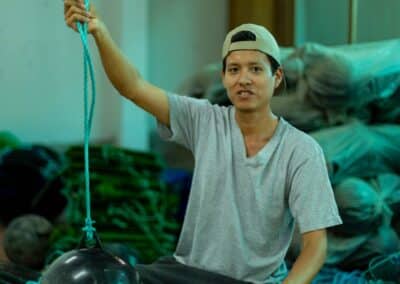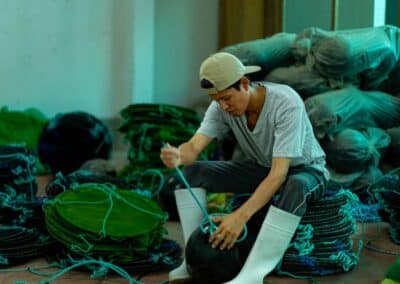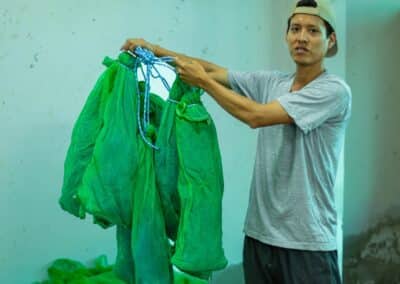Xavier Alarico works as a mariculture farmer in Sechura Bay, in the Department of Piura (Peru). He is one of the 300 mariculture farmers (men and women) participating in a project that we are developing in collaboration with our local partner ESCAES and with financing from the AECID, which aims to promote the inclusive and sustainable economic development of the population of this region and improve the competitiveness of the fan shell cultivation value chain.
Before taking part in this project, Xavier and his colleagues risked their lives developing their work. “We used to look for seeds in natural banks to transfer to our growing areas, since we only cultivated fan shell bottom crops. Thus, we were always exposed to decompression problems due to going down too deep,” explains Xavier.
In addition, he remembers that they also assumed other risks, such as having to acquire a farming area in the sea at a high cost, which affected their own family finances. On the other hand, he also refers to the scarcity of seeds and adverse natural phenomena as elements that made the production of fan shells difficult.
“However, our determination to move forward led us to look for a solution,” says Xavier. Thus, they decided to form the El Rey Seafood Growers Association, with the objective of “adapting to carry out our activity in a more efficient and sustainable way.” This is how, together, they learned about the work of ESCAES and found the opportunity to be part of this project.
Precisely, one of the key components of this initiative has to do with promoting training and innovation with a view to improving productivity and guaranteeing the economic and environmental sustainability of the livelihoods and economic income of seafood farmers.
In this way, people like Xavier had the opportunity to receive a series of training that has allowed them to improve their skills and knowledge regarding aquaculture farming techniques. They were also able to participate in a course to become certified as divers and, on the other hand, receive training related to the innovation of suspended cultivation, which today allows them to carry out their activity without having to assume dangers that put their lives at risk.
“Participating in this project has marked a before and after in our lives as mariculture farmers,” acknowledges Xavier, who adds that, within the framework of this project, they have also received equipment, materials and tools that make their work easier, among which are GPS, depth gauges, compressors, diving equipment and plankton nets, among others.
“These improvements not only impact our individual lives, but also our community and our families,” he says. “We have improved our income and generated sources of work for other members of the community, so we are contributing to the economic and social development of our region in a sustainable and responsible manner,” concludes Xavier with satisfaction and gratitude.











